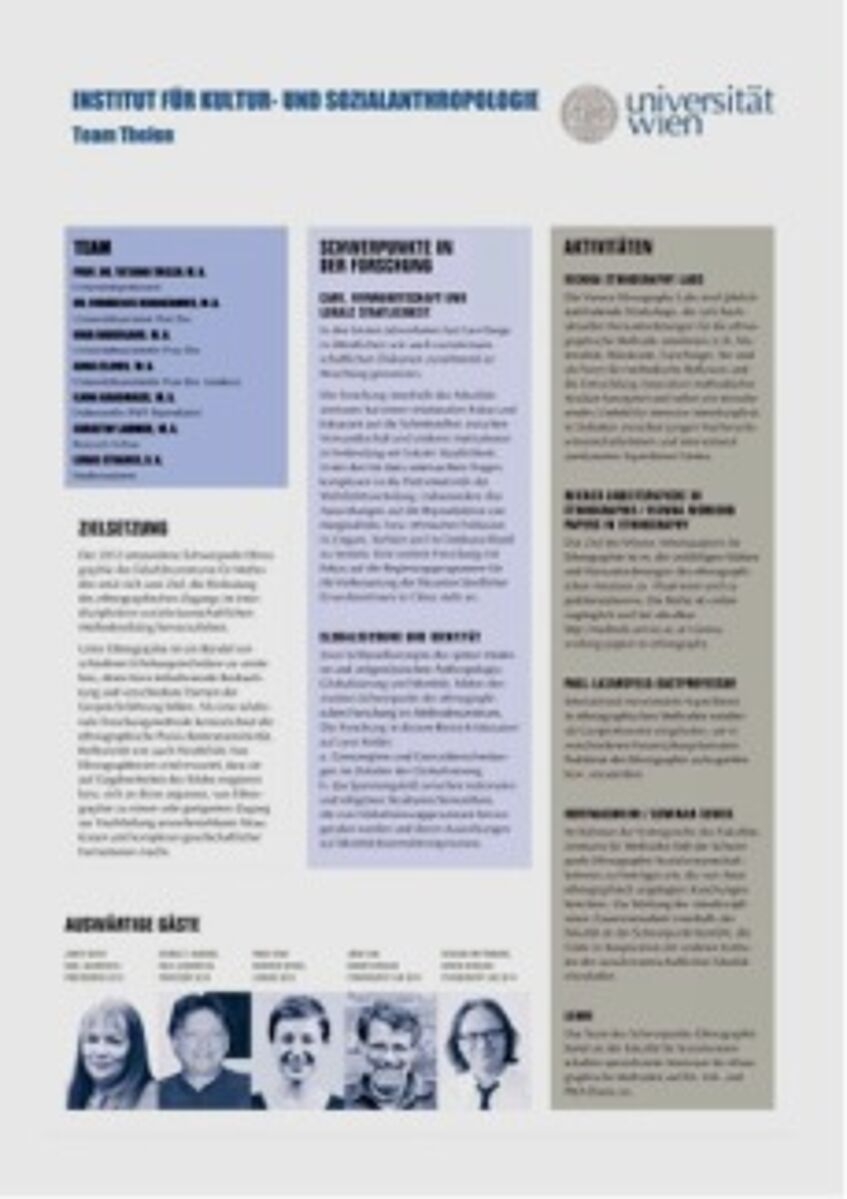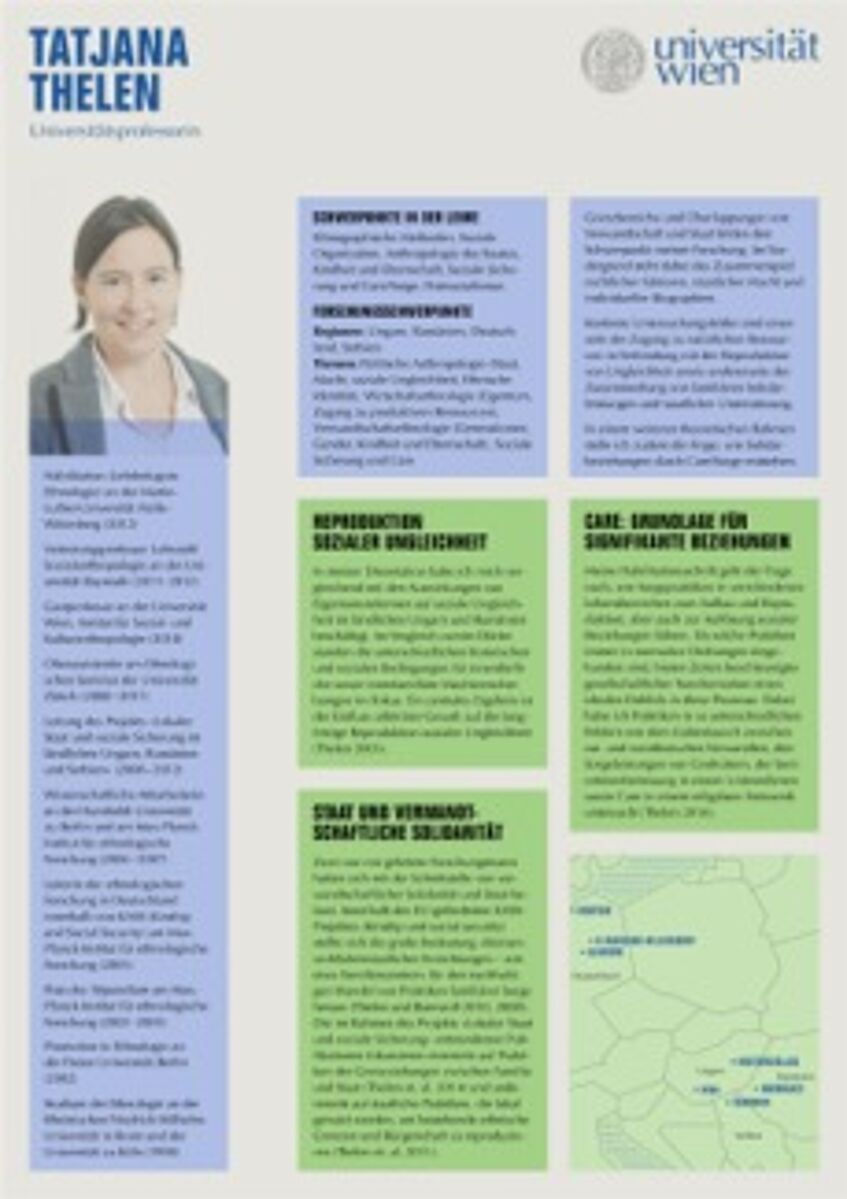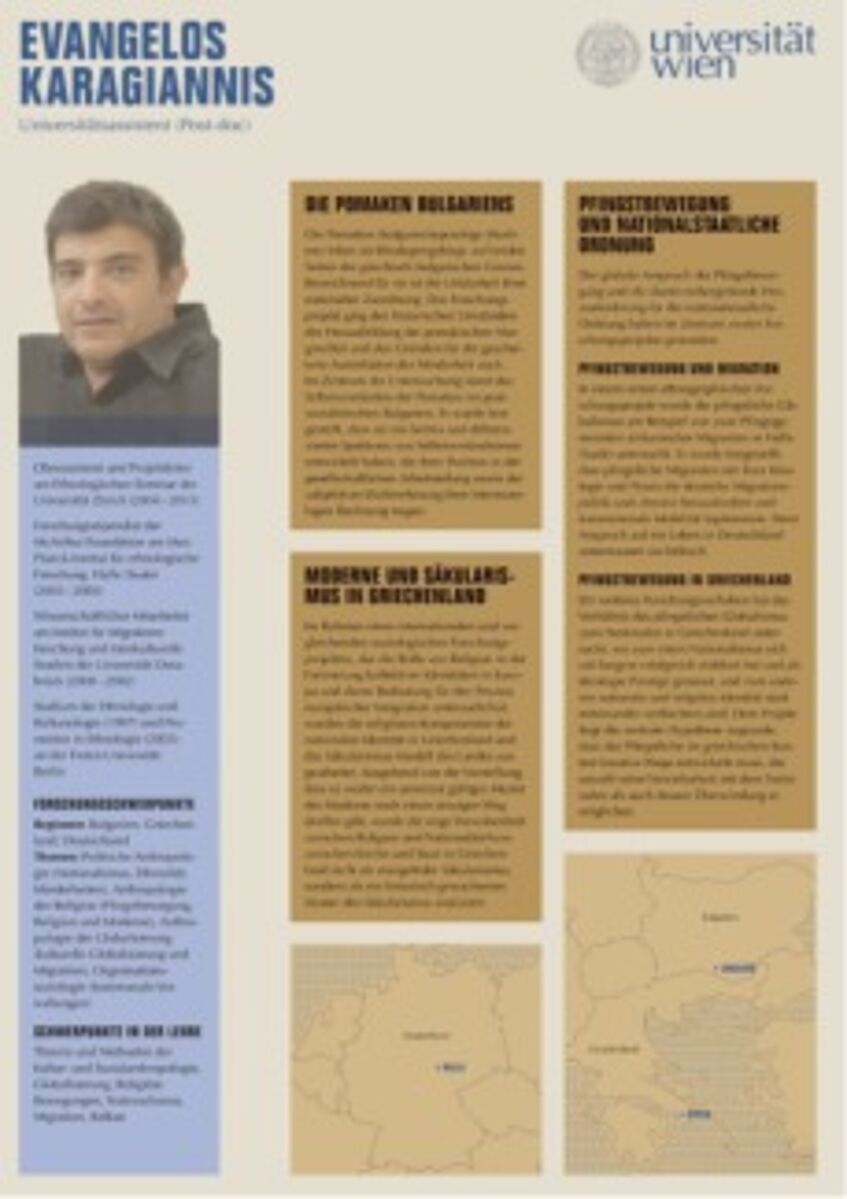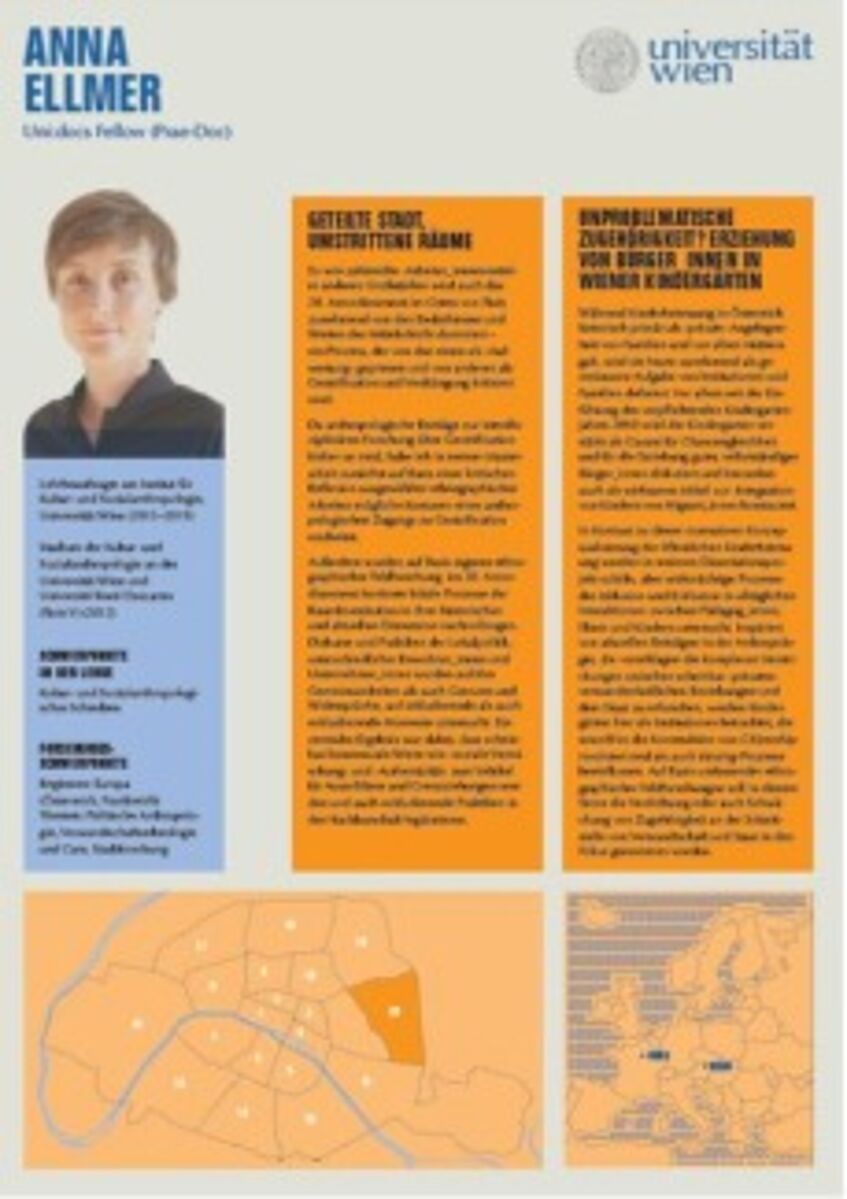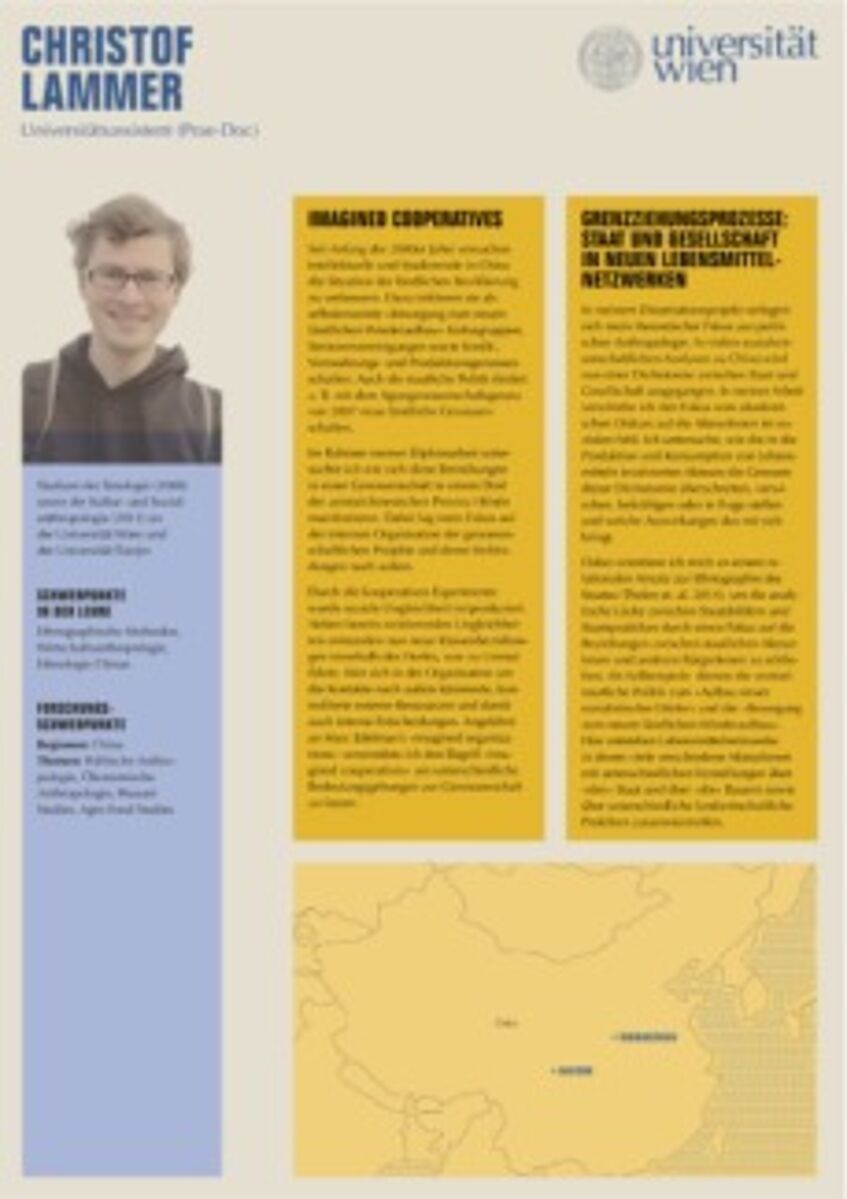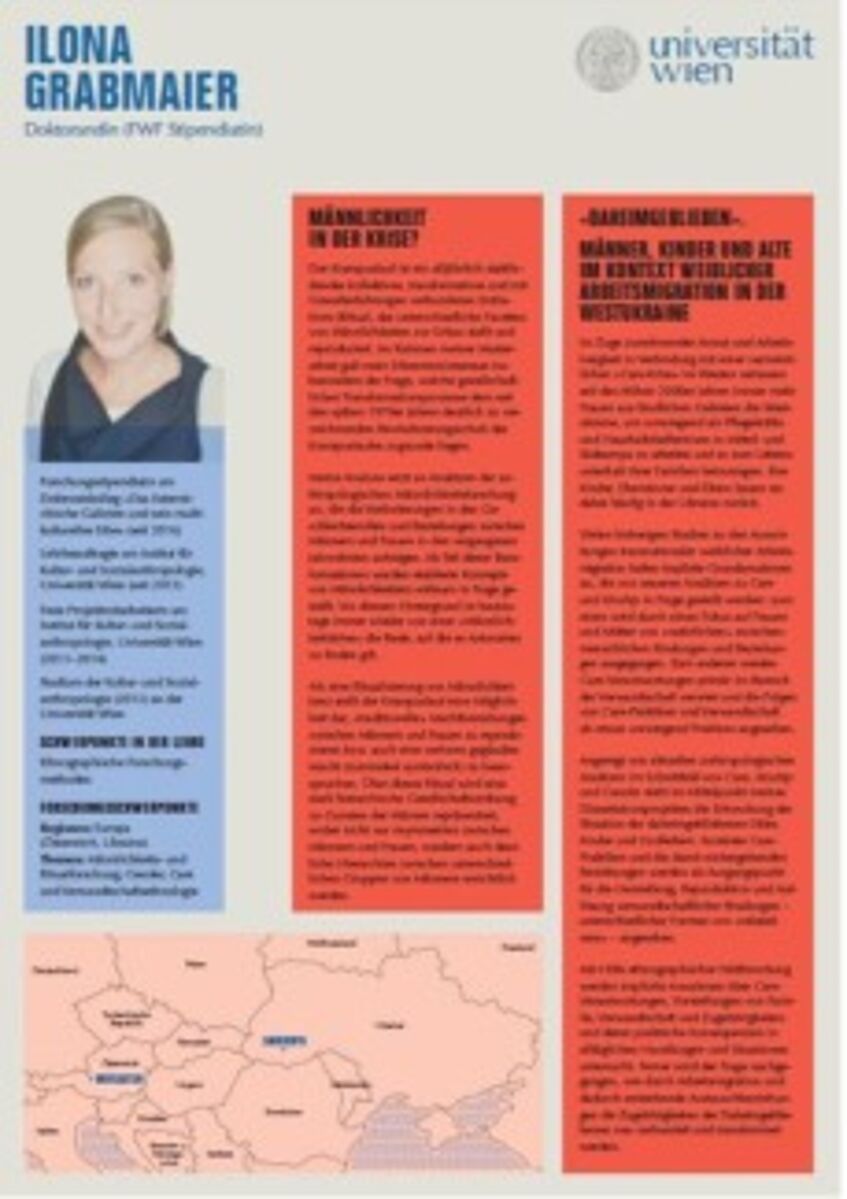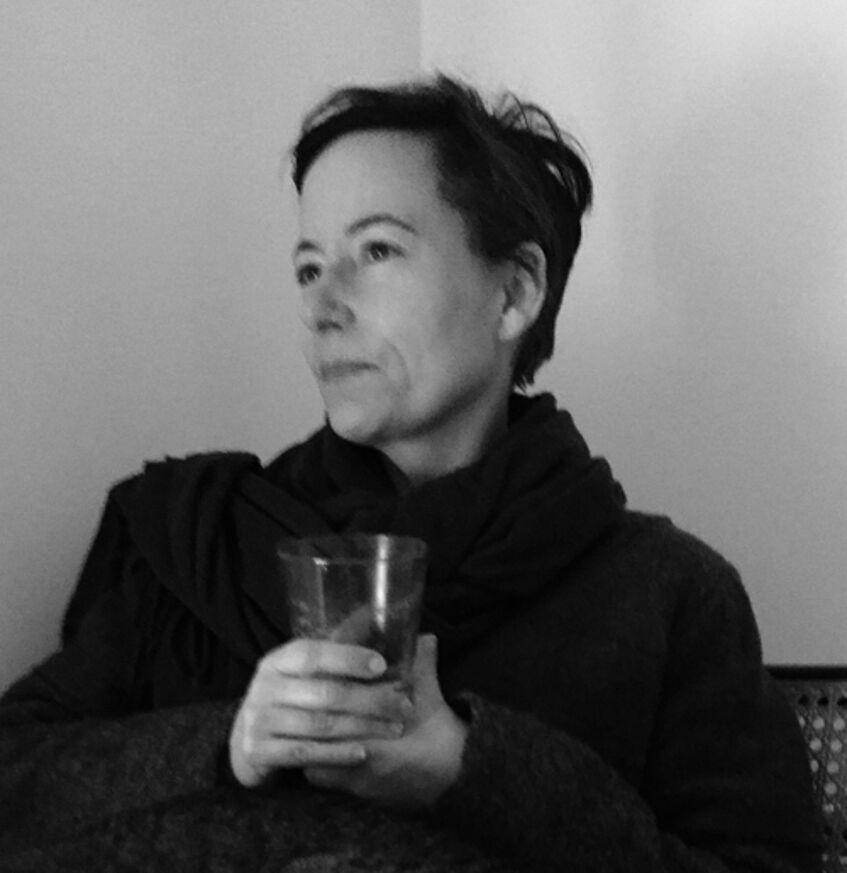
Univ.-Prof. Dr. Tatjana Thelen
Univ.-Prof. Dr. Tatjana Thelen
Professor of Social and Cultural Anthropology
Deputy Director of Studies: Vienna Doctoral School of Social Sciences (ViDSS)
Deputy Speaker of the ViDSS
Member of the steering committee at ViDSS
Deputy head of Research Platform for the Study of Transformations and Eastern Europe
Founder of https://www.univie.ac.at/cast
Editor of Vienna Working Papers in Ethnography (VWPE)
Organiser of Vienna Ethnography Laboratories (Ethnolabs)
2025: Visiting Research Fellow at the New School (US)
2023: Distinguished Visiting Austrian Chair, Stanford University
2020-21: Fellow at the Institute for Advanced Study (IAS), Paris
2016-17: Fellow at the Center of Interdisciplinary Research, Bielefeld University
Contact Details
Department of Social and Cultural Anthropology
Universitätsstraße 7, 1010 Vienna
NIG, 4th floor
Room: B0404
T: +43-1-4277-49560
E-Mail: tatjana.thelen@univie.ac.at
Office Hours
No regular office hours during summer semester 2025 (sabbatical).
If you have any questions, please send an e-mail to hanna.vietze@univie.ac.at
Research Focus Areas
- Kinship, Law and the State
- Economy, Property and Social Change
- Care, Difference and Social Security
- (Post-)Socialist Societies
- Relational Theory
Short Biography
Tatjana Thelen is a full professor at the Department of Social and Cultural Anthropology at the University of Vienna since 2012. She is currently writing on the role of "political atmospheres" in iterative demarcations of state boundaries, in ways that reinforce or forge belonging. This study traverses multiple social-science disciplines and diverse European landscapes to show that such atmospheres, as meaning-making practices generating nascent critique, are not only impacted by institutions, the state and political change but also profoundly shape them.
Having studied social anthropology at the Universities of Bonn and Cologne, her academic journey began with an ethnographic exploration of economic transformations in postsocialist Hungary and Romania. With a specific focus on property relations, this research formed the basis of her dissertation at the Free University of Berlin in 2002. Generating insights into persistent biases prevalent within the social sciences, particularly on East and Southeast European societies, this phase of ethnographic work also highlighted the broader adverse consequences of relying on entrenched preconceptions about these regions.
She was involved in developing a relational approach to the state as Senior Researcher in the Working Group of Legal Pluralism at the Max Planck Institute for Social Anthropology in Halle (Saale). Shifting her ethnographic focus to eastern Germany, she developed care as an analytic concept bridging the fields of economic and political anthropology, demonstrating its centrality to social organisation. A Volkswagen-funded project on access to natural and state resources in rural areas allowed her to continue this line research through fieldwork in Hungary, Romania, and Serbia. Increasingly, the epistemic consequences of the separation of kinship and state became an additional focus of her research. This question was also at the heart of an interdisciplinary research group at the Center for Interdisciplinary research in Bielefeld, which she headed with colleagues from Los Angeles, Zurich, and Bayreuth.
Tatjana Thelen was the Distinguished Visiting Austrian Chair at Stanford for the academic year 2023, Fellow at the Institute for Advanced Study in Paris in 2020/21, and is co-directing the Research Platform for the Study of Transformations and Eastern Europe.
Selected Publications
- 2025. Diversity in Ageing: a social anthropological perspective (in German). In: Rudolf Likar, Georg Pinter, Walter Müller, Dieter M. Schmidt (eds.): Lebenskunst Älterwerden. Licht und Schatten des Alterungsprozesses. Berlin: Springer Nature, 197–213. https://doi.org/10.1007/978-3-662-70207-9
- 2024. What's in a family? Comment on Michael Lambek's Behind the Glass. The Villa Tugendhat and its family. In: HAU Journal of Ethnographic Theory 14 (2): 528–532. https://doi.org/10.1086/731137
- 2023.The Politics of Making Kinship. Historical and Anthropological Perspectives. New York, Oxford: Berghahn. (together with Erdmute Alber, David Sabean and Simon Teuscher) https://doi.org/10.3167/9781800738003
- 2023. Kinship: Old problems and new prospects in the conversation between archaeology and social anthropology. In: Harald Meller, Johannes Krause, Wolfgang Haak and Roberto Risch (eds.): Kinship, Sex, and Biological Relatedness. The contribution of archaeogenetics to the understanding of social and biological relations, 29–34. https://doi.org/10.11588/propylaeum.1280
- 2023. The gift as critique – a social anthropological perspective (in German). In: Michael Hutter and Birger P. Priddat (eds.): Geben, Nehmen, Teilen. Gabenwirtschaft im Horizont der Digitalisierung. Frankfurt, New York: Campus Verlag, 65–78.
- 2022. Stategraphy: A Social Anthropological Approach to the State. In: Miriam Fahimi, Elmar Flatschart and Wolfram Schaffar (ed.) State and Statehood in the Global South. Cham: Springer, 49-65. https://doi.org/10.1007/978-3-030-94000-3_3
- 2022. Sorge als 'Grenzobjekt': Ein ethnographischer Ansatz zur Unterscheidung öffentlich/privat. In: Bettina Hünersdorf (ed.) Going Public. Erziehungswissenschaftliche Ethnographie und ihre Öffentlichkeiten. Wiesbaden: Springer VS, 17-31. https://doi.org/10.1007/978-3-658-34085-8_2
- 2022. Politics and Kinship: A Reader. Abingdon, UK: Routledge (together with Erdmute Alber). https://www.routledge.com/Politics-and-Kinship-A-Reader/Alber-Thelen/p/book/9780367408718
- 2021. Introduction: Measuring Kinship, Negotiating Belonging. Social Analysis 65 (4): 1–22. (together with Christof Lammer). https://www.berghahnjournals.com/view/journals/social-analysis/65/4/social-analysis.65.issue-4.xml
- 2021. Entfesselte Verwandtschaft. Review of Relations. An Anthropological Account by Marilyn Strathern. Durham, NC: Duke University Press. Soziopolis. Gesellschaft beobachten. Available online: https://soziopolis.de/lesen/buecher/artikel/entfesselte-verwandtschaft/
- 2021. Care as Belonging, Difference, and Inequality. In: Mark Aldenderfer (ed.) Oxford Research Encyclopedia of Anthropology. New York: Oxford University Press. https://doi.org/10.1093/acrefore/9780190854584.013.353
- 2021. 养老带来政治归属:时间维度、表征形式以及相互性. Chinese translation of "Political Belonging through Elder Care: Temporalities, Representations and Mutuality", Journal of Qinghai Minzu University 46 (4): 9–21. (together with Cati Coe).
- 2019. Political belonging through elder care: Temporalities, representations and mutuality. Anthropological Theory 19 (2): 279-299. (together with Cati Coe) http://journals.sagepub.com/doi/pdf/10.1177/1463499617742833
- 2018. Socialism: Marxist-Leninist-Maoist. In: Hilary Callan (Hg.) International Encyclopedia of Anthropology. Hoboken: John Wiley & Sons. https://doi.org/10.1002/9781118924396.wbiea1836
- 2018. Property. In: Hilary Callan (Hg.) International Encyclopedia of Anthropology. Hoboken: John Wiley & Sons. https://doi.org/10.1002/9781118924396.wbiea2349
- 2017. Reconnecting State and Kinship. Philadelphia: University of Pennsylvania Press. (together with Erdmute Alber). http://www.upenn.edu/pennpress/book/15744.html, https://www.combinedacademic.co.uk/reconnecting-state-and-kinship
- 2017. Stategraphy: Toward a Relational Anthropology of the State (revised reprint). New York: Berghahn Books. (together with Larissa Vetters and Keebet von Benda-Beckmann). http://www.berghahnbooks.com/title/ThelenStategraphy
- 2015. Care as Social Organisation: Creating, Maintaining and dissolving significant relations. Anthropological Theory 15 (4): 497-515.
The Team
Assistants
Research Associates / Guests
FWF doc.funds
Marietta Blau Stipendium
ÖAW
Research Platform "Transformations and Eastern Europe"
SowiDocs
Former team members
Ilona Grabmaier
Former guests
Team Research Focus Areas
Care, Kinship and the State: Processes of belonging and the Production of Difference
Over the last decades care has increasingly gained attention in both public and scientific discourses. The team's research is characterised by a relational approach to the (re-)production as well as the dissolution of significant relations and difference through care. Thereby, care has immense political importance for political subjectivities, belonging and the reproduction of the state at different layers. The individual projects centre around interfaces between of private and public spheres, e.g. within institutions like public childcare or senior citizen welfare. One focus is the performativity and impact of welfare practices on the reproduction of social marginalisation based on constructions of cultural difference. A second focus consists of the reproduction and reconfiguration of kinship and state as separate units. In both instances translations of globally circulating ideas and concepts are central.
Relevant Links
- Vienna Ethnography Laboratories (Ethnolabs)
- Vienna Working Papers in Ethnography (VWPE)
- Research Network Care & State (CAST)
- Paul-Lazarsfeld-Visiting-Professorships
- Directorate of the Doctoral Study Programme
- Center for Interdisciplinary Research (ZiF), University of Bielefeld
- LOST Research Network
- Visegrád Anthropologists' Network
- Doktoratskolleg Galizien

